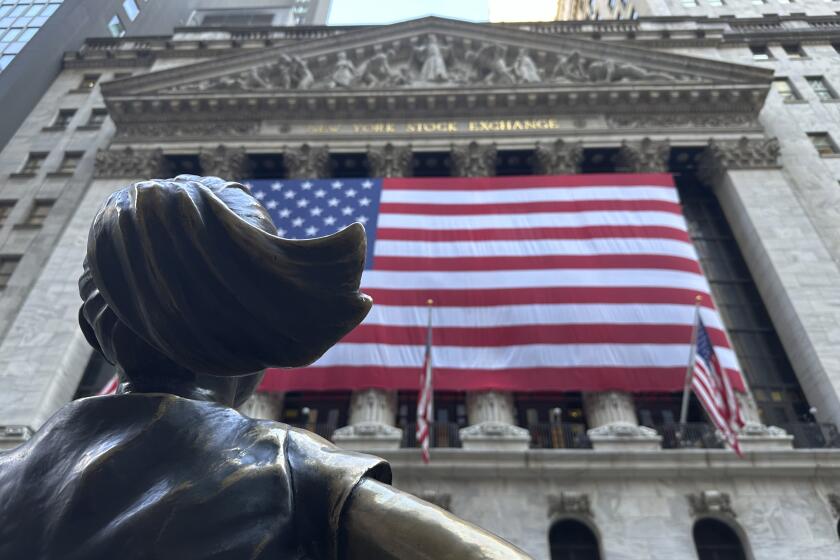Car-Rating Firm Starts to Research Computers : Studies: J. D. Power & Associates branches out into syndicated surveys of customer satisfaction with various brands.
J. D. Power & Associates is a small firm with about $14 million in annual revenues and 180 employees, but its name has become virtually synonymous with automotive quality. Widely known for its rankings of cars based on customer satisfaction, the Agoura Hills research firm is frequently credited with making auto makers more responsive to consumers.
Now Power wants to do the same thing with computers. The time is right, the company says, because computer manufacturers, long driven by technology, are just now waking up to the need to put more emphasis on customer service.
“We’re putting the focus on the plight of the user,” said James David Power III, the 60-year-old founder and majority owner of the firm that bears his name.
Power started his business in 1968 and his company has done proprietary computer studies for 15 years. But it wasn’t until last year, prodded by industry requests, that he decided to launch a series of computer surveys that would measure customer satisfaction for several different brands. Power calls these syndicated computer studies and, much like his auto industry surveys, they would then be sold to any company willing to pay for them.
So far, Power has conducted two syndicated computer studies. The first, released late last year, was based on interviews with vendors who sell computer equipment.
But it’s the second computer study that has been getting the most attention because it went a step further than most other computer industry surveys and polled the actual end-users of personal computers, software and printers. The survey, measuring customer satisfaction at small- to medium-sized businesses, was conducted last winter and the names of the highest-ranking companies were made public last month.
Sixteen personal computer manufacturers, nine printer companies and nine software makers were rated in the study. Dell Computer Corp. of Austin, Tex., placed the highest in the PC category, and Apple Computer Inc. of Cupertino, Calif., was second. Borland International Inc. of Scotts Valley, Calif., was the top-rated software company; WordPerfect Corp. of Orem, Utah, was runner-up, and Hewlett-Packard Co. of Palo Alto won top honors for its printers, followed by Apple.
Notable for its absence among above-average companies in all categories in Power’s survey is industry giant IBM.
Dean Kline, an IBM spokesman, wouldn’t comment on the Power survey. But he said IBM does its own studies and “our findings . . . indicate a high level of customer satisfaction.”
Later this year, Power plans to announce the computer companies rated highest by end-users at large companies and home-based businesses.
But will Power’s computer surveys be as influential as his auto industry studies? Some critics think not, partly because the computer business works differently than the auto industry. For one thing, computers used by businesses are usually purchased by someone other than the person who actually uses the machine. Also, computer companies often tailor products to specific customer needs, which calls into question the relevance of broad rankings of overall customer satisfaction.
“Gauging consumer satisfaction in industries like autos is a lot easier,” said Steve Higgins, senior editor at the trade magazine PC Week. “With computers, there are so many different products that meet so many different needs. What’s good for one company might not be good for another.”
But Power countered that end-users often have a say in computer purchasing decisions and computer manufacturers must pay attention to their complaints. Also, he said, no matter how sophisticated or specialized a computer, customers aren’t happy if the service isn’t good--and that can mean the difference between keeping business and losing it.
The computer end-user survey included telephone interviews of employees at 1,784 businesses drawn randomly from a database that Power purchased from another research firm. Respondents were paid a token $1 each and asked to give lengthy answers to questions dealing with reliability, ease of use, versatility, service and overall satisfaction.
Power said he spent “well over half a million dollars” on the study, which he is selling to computer companies for $40,000 to $200,000 each, depending on the size of the company.
The most striking finding of the study, said Ellen Luby, Power’s research director, is that most computer users don’t want highly sophisticated equipment. “For the average business user, the needs are fairly simplistic,” Luby said. “You lose sight of that when you get so caught up in the invention and the improvements.”
As with its auto industry surveys, Power made public only the names of those companies scoring above the industry average--a practice that has been widely criticized because of the perception that Power is bowing to industry pressure not to publish negative news.
Many auto industry observers also complain that Power’s car rankings have become tainted because there is a seeming blizzard of good news advertisements by car companies eager to promote their high J. D. Power rankings. (In contrast, Consumer Reports doesn’t allow its survey results to be used in ads, nor does it take money from the companies it studies.)
The problem, critics say, is that because Power ranks cars in many categories, any number of manufacturers can make claims to being No. 1 in its class. In a Power survey released last year, for example, the Buick LeSabre was rated best American-made car, a finding that General Motors--which manufactures the car--trumpeted in its ads. What wasn’t mentioned in the ads was that many Japanese cars scored higher or that Ford Motor Co. won the ranking of highest quality in American-made cars overall.
“I think the numbers are good numbers,” said Richard Ceppos, an editor at Car & Driver magazine. “But by the time you get done, everybody has a claim to something.”
In addition, more criticism has been heaped on Power because it charges manufacturers extra fees to review any ads that mention Power’s surveys. For reviewing Buick’s TV, print and radio ads one year, for instance, Power charged $35,000.
Now, armed with the computer survey results, computer companies are rushing out with new ads. Dell, for instance, has begun running TV commercials promoting its first-place finish in the PC category.
Some computer industry observers worry that the public will become barraged with the same kind of confusing claims that car makers have made based on Power’s studies. “I don’t care how good the design of a study is,” said Richard Zwetchkenbaum, a senior analyst at International Data Corp., a Framingham, Mass., computer research and consulting firm. “The advertising element detracts from the power of it.”
Nonetheless, Power defended his way of doing business, noting that the studies are “designed as a tool for the manufacturers” to improve quality. The important point, he said, is whether the studies actually get the manufacturers to pay more attention to quality issues. Among computer companies, he contended, “we’ve already had a major impact.”
Power, a Massachusetts native, earned his MBA degree at the University of Pennsylvania’s Wharton School of Finance and worked for Ford, GM and the auto-market research firm Marplan.
In addition to the surveys, Power also publishes three newsletters with yearly subscription rates ranging from $195 to $495. The company also does consulting work in industries ranging from banking to tanning beds, and conducts management training programs for the auto industry.
As Power’s prominence has grown, he has turned to the tricky business of prognosticating trends. He once predicted, for instance, that the Yugo, the Yugoslavian-built subcompact car, would be a great success.
Shortly after it was introduced in 1985, the Yugo was panned by consumer and safety advocates and came to be known as “the worst car in America.” Its U. S. importer filed for bankruptcy protection and Power had to write off about $35,000 in bills that it was owed for Yugo market research.
Nonetheless, Power’s enthusiasm remains undaunted. He said he hopes some day to conduct syndicated customer satisfaction surveys for industries such as banking, airlines, hotels and telecommunications.
He has also been working on his “pet project,” the Customer Satisfaction of America survey, a sweeping national study that seeks to gauge Americans’ views on 275 products, services, professions and institutions.
Among the preliminary findings: Cruise ship food rated the highest in consumer satisfaction; 900 telephone numbers rated the lowest. Doctors ranked much higher than lawyers. And Californians were less satisfied with just about everything than residents of other states.
More to Read
Inside the business of entertainment
The Wide Shot brings you news, analysis and insights on everything from streaming wars to production — and what it all means for the future.
You may occasionally receive promotional content from the Los Angeles Times.







